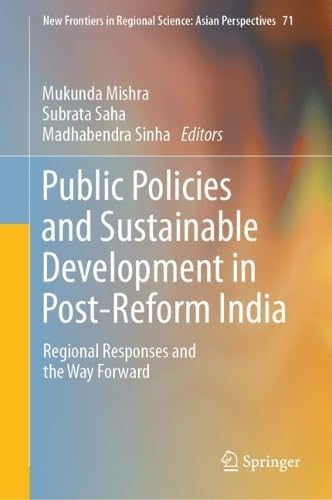
Free Download Public Policies and Sustainable Development in Post-Reform India : Regional Responses and the Way Forward by Mukunda Mishra, Subrata Saha, Madhabendra Sinha
English | PDF (True) | 2023 | 424 Pages | ISBN : 9819936950 | 7.6 MB
This book portrays India as a representative of post-colonial democratic republic states with a parliamentary form of federal-structured government and analyzes the critical challenges faced by such states in generating broadly shared economic well-being and quality of life. The reader is shown how creating and utilizing physical, human, financial, and social assets under the aegis of public policies help achieving the Sustainable Development Goals (SDGs) to provide a global framework to move toward a more equitable, peaceful, resilient, and prosperous society by 2030. It not only addresses how the state’s capacity has long been linked to the available economic resources, but also unfolds how the political system thus evolves to crucially determine the capacity of the state to implement its programs. The chapters of this book are particularly focused on judging the state’s capacity amid the neo-liberal ascendancy that has been triggered by the opening up of both the domestic and external economy, significantly initiated since 1991 and popularly known as the economic reforms in India.
Examined here is the potency of the public policies of the country in fulfilling the sustainable development agendas, the specificity of which places the state at the heart of its execution, unlike many other versions of development that would be executed in parallel with or without states’ action. This work book has three principal foci facets within the broad swath of discussions covered by different chapters: (1) It critically examines how successful remains the public policies in mobilizing the population is mobilized to the next orbit of income, employment, education, and health consequent to amid the existing considerable magnitude of social and economic inequalities while achieving "equity" has always been the declared agenda in the post-reform public policy frameworks; (2) It traces the rationality of the transformation of the public policies and welfare strategies during the post-reform period in terms of motives, goals, and coverage to achieve the SDGs; and, (3) It reviews specific post-reform policies in terms of their potency to stimulate the system in addressing sustainable development. and upholding the state’s dominant and structuring intervention to resolve the existing inequalities and ensure that society develops amidst a harmonious world reconciled with nature.
[/b]










Leave a Reply
You must be logged in to post a comment.